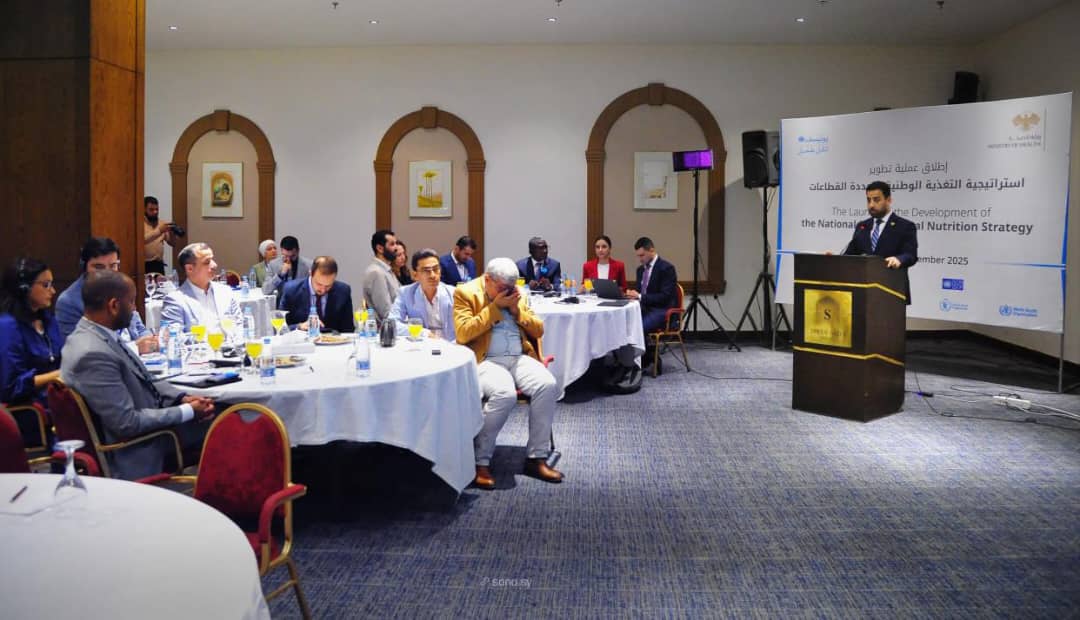The Syrian Ministry of Health Launches the Development of the National Nutrition Strategy

On Wednesday, the Ministry of Health launched the development of the multi-sectoral national nutrition strategy during a workshop held at the Seven Gates Hotel in Damascus, in collaboration with national and international partners, to establish a comprehensive response to the nutritional challenges facing the country.
This was attended by Finance Minister Mohammad Yaser Barniya, Assistant Minister of Health Hussein Al-Khatib, representatives from the Ministries of Foreign Affairs, Agriculture, and Energy, as well as delegates from international organizations.
In the context of identifying the scale of the challenge, the directorate revealed shocking statistics, with the Director of the Nutrition Program at the Primary Health Care Directorate of the Ministry of Health, Hala Dawood, stating that "the cause of deaths among children under the age of 5 is malnutrition according to the World Health Organization and UNICEF".
Dawood pointed out a clear increase in the mortality rate from 17.6% to 28.7% between a survey conducted by the ministry in 2008 and another in 2019. She also indicated that "the SMART study conducted in 2019 and 2023 showed an increase in the rates of acute malnutrition from 1.7% to 4.8%", noting that "one in four children under five suffers from stunting, which affects the child's cognitive abilities, and that one in three women suffers from anemia during their reproductive years".
Health Minister, Musab Al-Ali, affirmed in his speech the ministry's vision towards "building an integrated and healthy health system that provides equitable healthcare of quality that is accessible to all members of society, including good nutrition", emphasizing that nutrition "is not just a medical issue, but a developmental issue that intersects with food security, water, education, social protection, and financing".
Al-Ali stressed that "prevention is a priority, as every investment in good nutrition today is an investment in human capital and a prosperous economy tomorrow", clarifying the necessity of "coordinating joint work and ministerial cooperation and focusing on the most vulnerable groups, especially children under five, mothers, and low-income communities".
For his part, the Director of Planning and International Cooperation at the Ministry of Health, Zuhair Al-Qar'at, indicated that "the success of any national nutrition plan requires real integration between the sectors of health, agriculture, water, education, and social protection in cooperation with international partners to coordinate visions and draw a clear roadmap that places the needs of Syrians at the heart of priorities".
Al-Qar'at warned that "the health and humanitarian reality imposes a double responsibility, in light of the high rates of acute and chronic malnutrition, especially among children and women, which threatens the future of upcoming generations", calling for "sustainable solutions and ensuring their reach to every area and every needy family".
For her part, the UNICEF representative in Qatar, Zainab Adam, warned that "all statistics confirm the risk of malnutrition spreading", emphasizing that this "requires diligent work to secure continuous sources of food for children and mothers through resource allocation and collaboration among various sectors".
For his part, the Director of the Nutrition Program at UNICEF, John Ntambi, emphasized the "importance of achieving the essential pillars for building proper nutrition that includes the diet, securing appropriate services, and serious practices that ensure sustainable food provision and access", focusing on "the topic of breastfeeding, providing nutrients, and ensuring a suitable environment".
This workshop is considered a fundamental step in addressing the nutritional challenges in Syria, striving for a healthier and safer future, and economic and social advancement.